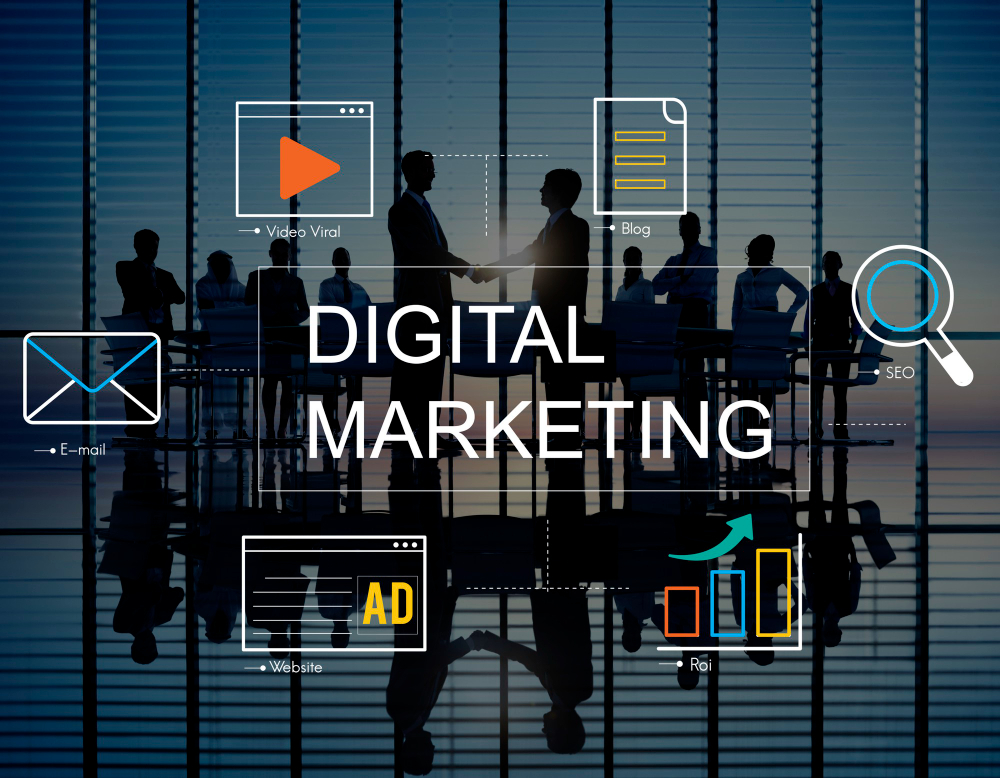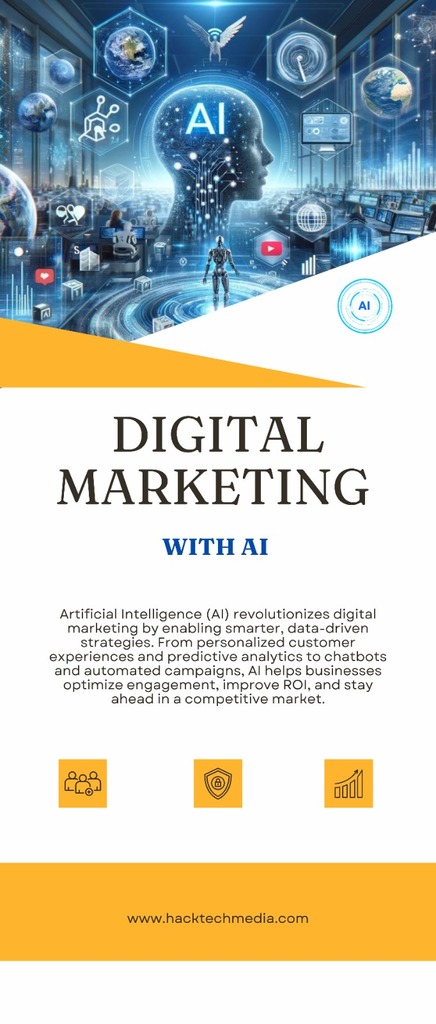
In today’s fast-paced digital landscape, the integration of artificial intelligence (AI) is transforming marketing strategies, offering businesses innovative ways to engage with customers, enhance efficiency, and improve decision-making. As AI technologies evolve, their applications in digital marketing are becoming more sophisticated, enabling companies to harness data and insights that were previously unattainable. This blog will explore the various ways AI is revolutionizing digital marketing strategies, focusing on marketing automation, personalization, customer insights, predictive analytics, chatbots, content creation, targeted advertising, and emerging trends.
The Role of AI in Digital Marketing
AI refers to the simulation of human intelligence processes by machines, particularly computer systems. In digital marketing, AI is utilized to analyze vast amounts of data, automate repetitive tasks, and optimize marketing campaigns. This technology empowers marketers to create more personalized experiences, predict customer behavior, and make data-driven decisions.
Marketing Automation
One of the most significant advancements AI has brought to digital marketing is automation. Marketing automation involves using software to automate repetitive tasks such as email marketing, social media posting, and ad management. AI takes this a step further by enabling smarter automation that learns from data patterns and improves over time.
Benefits of Marketing Automation
- Increased Efficiency: By automating routine tasks, marketers can save time and focus on strategic planning and creative initiatives.
- Enhanced Customer Engagement: Automated systems can send timely and relevant communications to customers, ensuring they receive messages when they are most likely to engage.
- Improved ROI: AI-driven marketing automation can lead to better-targeted campaigns, resulting in higher conversion rates and a more significant return on investment.
For example, AI can analyze customer behavior to determine the optimal time to send promotional emails, leading to higher open and click-through rates.
Personalization Strategies
Personalization is crucial in today’s marketing landscape, where consumers expect tailored experiences. AI enables marketers to create highly personalized interactions by analyzing individual customer data and behavior.
How AI Enhances Personalization
- Segmentation: AI can analyze data from various sources to segment audiences based on demographics, behavior, and preferences. This allows marketers to create targeted campaigns that resonate with specific customer groups.
- Dynamic Content: AI can generate personalized content for emails, websites, and advertisements. For instance, e-commerce platforms can recommend products based on a customer’s previous purchases and browsing history.
- Behavioral Targeting: By monitoring user interactions, AI can predict what content or products a customer is likely to be interested in. This level of targeting increases engagement and conversion rates.
A study by Epsilon revealed that personalized emails can lead to a 29% higher open rate and a 41% higher click-through rate compared to non-personalized emails.
Customer Insights
Understanding customer behavior is critical for effective marketing. AI provides powerful tools for gathering and analyzing customer data, generating insights that can drive marketing strategies.
How AI Provides Customer Insights
- Data Analysis: AI can process large volumes of data quickly, identifying trends and patterns that would be impossible for humans to discern. This analysis helps marketers understand customer preferences, pain points, and purchasing behavior.
- Sentiment Analysis: AI tools can analyze social media and online reviews to gauge customer sentiment toward a brand or product. This information allows marketers to adjust their strategies in real time based on customer feedback.
- Customer Journey Mapping: AI can track and analyze the customer journey across various touchpoints, providing insights into how customers interact with a brand. This information helps marketers optimize the customer experience and improve retention.
Predictive Analytics
Predictive analytics is a game-changer in digital marketing, allowing businesses to forecast future customer behavior based on historical data. AI algorithms can analyze patterns to predict outcomes, enabling marketers to make proactive decisions.
Applications of Predictive Analytics
- Customer Segmentation: Predictive analytics can identify which customers are most likely to convert, allowing marketers to focus their efforts on high-potential segments.
- Churn Prediction: By analyzing customer behavior, AI can identify signs of potential churn. Marketers can then implement targeted retention strategies to keep these customers engaged.
- Sales Forecasting: AI can analyze sales data to predict future trends, helping businesses make informed decisions about inventory, staffing, and marketing budgets.
For example, a retailer may use predictive analytics to determine which products are likely to be in high demand during the upcoming season, allowing them to optimize inventory levels and marketing strategies accordingly.
Chatbots in Marketing

Chatbots have emerged as a vital tool in digital marketing, providing real-time customer support and engagement. Powered by AI, chatbots can handle a wide range of customer inquiries, improving the overall customer experience.
Benefits of Chatbots
- 24/7 Availability: Chatbots can assist customers around the clock, providing instant responses to inquiries and enhancing customer satisfaction.
- Lead Generation: Chatbots can engage website visitors in real time, qualifying leads and directing them to relevant resources or human representatives when necessary.
- Cost Efficiency: By automating customer service tasks, chatbots can reduce the workload on human support teams, lowering operational costs.
For instance, many e-commerce sites use chatbots to assist customers in finding products, answering questions about shipping, and providing personalized recommendations based on user preferences.
Content Creation
AI is revolutionizing content creation by enabling marketers to produce high-quality content more efficiently. AI-driven tools can assist in various aspects of content generation, from writing articles to creating visuals.
Applications of AI in Content Creation
- Automated Writing: AI tools can generate written content, such as blog posts, product descriptions, and social media updates, based on specific keywords and guidelines. This automation allows marketers to scale their content efforts.
- Content Optimization: AI can analyze existing content to identify areas for improvement. By providing recommendations on keywords, formatting, and structure, AI helps ensure that content is both engaging and optimized for search engines.
- Visual Content Generation: AI can create visuals, such as infographics and images, based on data input. This capability enables marketers to produce eye-catching content quickly.
For example, platforms like Jasper and Copy.ai use AI algorithms to assist writers in generating content ideas and drafts, streamlining the writing process.
Targeted Advertising
AI has fundamentally changed the landscape of targeted advertising, enabling marketers to reach their ideal audience with precision. Through advanced algorithms and data analysis, AI can identify and target specific consumer segments based on behavior and preferences.
Key Features of AI-Driven Advertising
- Real-Time Bidding: Programmatic advertising uses AI to automate the buying and selling of ad space in real time. This ensures that businesses can target their audience effectively while maximizing ad spend.
- Ad Personalization: AI allows for the personalization of advertisements based on individual user data. By tailoring ad content to user preferences, businesses can create more relevant and engaging experiences.
- Performance Optimization: AI can analyze ad performance metrics in real time, adjusting campaigns to improve results continuously. This adaptability helps maximize ROI and reduce wasted spend.
For instance, social media platforms like Facebook and Google utilize AI algorithms to analyze user behavior and deliver targeted ads that are more likely to resonate with individual users.
Emerging Marketing Trends
As AI continues to evolve, several emerging trends are shaping the future of digital marketing:
- Voice Search Optimization: With the rise of voice-activated devices, optimizing for voice search is becoming essential. AI can analyze voice search queries and provide insights on how to adjust content and SEO strategies accordingly.
- Visual Recognition Technology: AI-driven visual recognition technology allows marketers to analyze images and videos for better targeting and engagement. This technology can identify brand logos, products, and even emotions in visual content.
- AI Ethics and Transparency: As AI becomes more integrated into marketing, ethical considerations around data usage and transparency are gaining importance. Consumers are increasingly concerned about how their data is collected and used, prompting businesses to prioritize ethical AI practices.
- Hyper-Personalization: As data collection capabilities increase, hyper-personalization—delivering highly customized experiences to individual users—will become more prevalent. Marketers will leverage AI to analyze granular data and deliver tailored content, products, and offers.
Data-Driven Marketing
AI empowers marketers to adopt a data-driven approach, ensuring decisions are based on solid insights rather than assumptions. This approach involves several critical components:
- Collecting Relevant Data: Businesses must collect and analyze relevant data to drive their marketing strategies. AI tools can help gather data from various sources, including social media, website interactions, and customer feedback.
- Analyzing Data for Insights: AI algorithms can process and analyze large volumes of data quickly, providing actionable insights that guide marketing decisions. By understanding consumer behavior and preferences, businesses can tailor their strategies for maximum impact.
- Continuous Improvement: Data-driven marketing enables continuous improvement. Marketers can track campaign performance in real time, adjusting strategies based on what works and what doesn’t. This adaptability is crucial in today’s fast-paced digital environment.
Challenges and Considerations
While AI offers numerous benefits for digital marketing, organizations must also navigate certain challenges and considerations:
- Data Privacy: As AI relies heavily on data, businesses must prioritize data privacy and compliance with regulations such as GDPR. Ensuring that customer data is collected, stored, and used responsibly is paramount.
- Integration with Existing Systems: Integrating AI tools with existing marketing systems can be complex. Organizations need to ensure that their technology stack is compatible and that employees are trained to use new tools effectively.
- Dependence on Data Quality: The effectiveness of AI-driven marketing relies on the quality of the data being analyzed. Organizations must prioritize data accuracy and completeness to ensure that insights are reliable.
- Keeping Up with Rapid Change: The field of AI is evolving rapidly







